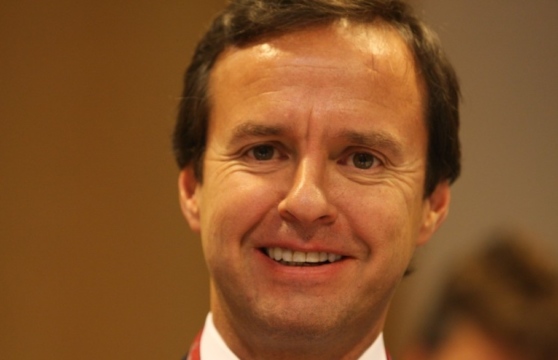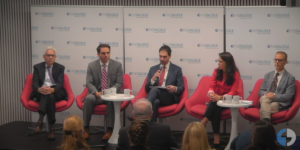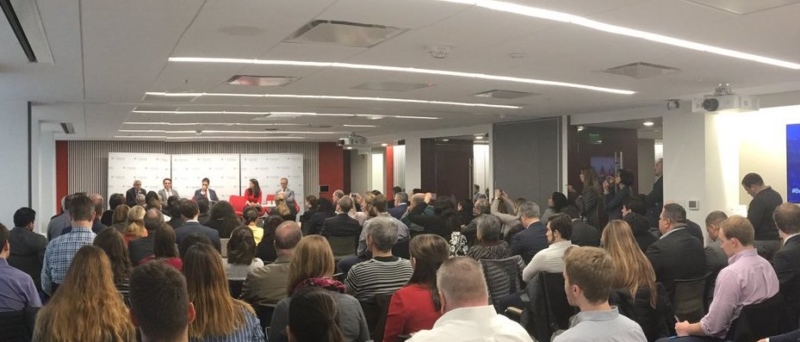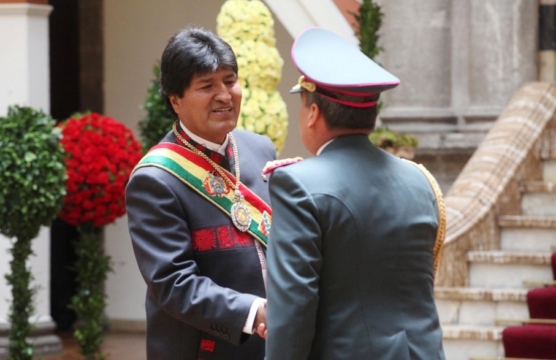
A Conversation with Jorge Quiroga
In early October, Morales announced he will run for a third presidential term . Is democracy under seige?
On November 22, 2019 the Inter-American Dialogue hosted the event “The Battle for Bolivia” in order to discuss the October 20 presidential election in Bolivia and the controversial change of government that followed it. Michael Camilleri, program director of the Dialogue´s Peter D. Bell Rule of Law Program, moderated the discussion. The speakers included Ambassador Carlos Trujillo, US permanent representative to the Organization of American States (OAS); Ambassador Jaime Aparicio, new Bolivian ambassador to the OAS; Marcela Escobari, senior fellow at the Brookings Institute; and John Walsh, director for Drug Policy and the Andes at the Washington Office on Latin America.
All the speakers agreed with Camilleri’s introductory remarks that called for a democratic, inclusive and peaceful path forward. Aparicio stated that President Áñez has only one mandate: call for free and fair elections as soon as possible. However she has faced problems as Morales' MAS party controls two-thirds of Congress. Áñez has to appoint a new electoral tribunal who will then set the date for new elections. In accordance with the other speakers, Trujillo expressed that free and fair democratic elections are the only solution to the crisis and Walsh commented that the legitimacy of the interim government depends upon fulfilling this mandate. Lastly, Escobari concurred by recognizing that the role of the interim government is indeed to move towards free and fair and transparent elections.
[caption id="attachment_97171" align="alignleft" width="300"] Panelists left to right: Aparicio, Trujillo, Camilleri, Escobari, Walsh[/caption]
Panelists left to right: Aparicio, Trujillo, Camilleri, Escobari, Walsh[/caption]
The speakers also condemned the violence and deaths that Bolivia has experienced but disagreed on who bears responsibility. Escobari worried that the situation could turn into a civil war but commended the armed forces for its notable restraint. Aparicio assured that the government would not make any excuse for the disproportionate use of force by the army. He warned “any person who thinks they can violate human rights [that] we are completely against the notion of impunity for human rights violations.” Walsh highlighted reports of the military opening fire on protestors and stressed the need for these incidents to be clarified and investigated as soon as possible and to not be repeated. He also called for the withdrawal of the government decree that would grant immunity to security forces for engaging in such abuses. Aparicio countered that this decree only protected the military as an institution from lawsuits arising from its deployment to maintain public order. He stressed that the decree does not give impunity for individual actions. Nevertheless, everyone welcomed the arrival of human rights investigators for the Inter-American Commission on Human Rights (IACHR) to look into these allegations of violations.
Several panelists also condemned the role of external actors in Bolivia. Trujillo called out the role of Evo Morales in destabilizing the country and lamented that, while claiming political asylum in Mexico, Morales is acting as a political actor and inciting violence. He condemned this as “a violation of the terms of the Vienna convention” and asked Mexican authorities to investigate Morales. If Morales is responsible for violence and not allowing people to have food and water, Mexican authorities not only have an obligation to stop it but to remedy it too. Aparicio accused Argentina of involving itself in Bolivian current events to Morales´ benefit and claimed that the country does not want Bolivia to fall for fear Argentina would then be isolated. He therefore argued that “for Argentina, it is a question of survival to keep Morales in power.”
The panelists expressed hope that negotiations would provide a way out of the crisis and highlights the role the MAS party will have to play. Walsh warned that Bolivia is in a dangerous moment as violence is coming from all sides. He approvingly cited the role of the Catholic Church and the European Union in inviting a dialogue, while noting that the interim government must deal with the fact that Morales’ MAS party has a two-third majority in the Congress. At the same time, MAS must accept that Áñez is president and in control. Aparicio agreed that MAS continues to hold an important political role but insisted that Morales and anyone else involved in the fraud must not be allowed to participate in the next election. He expects that MAS would only receive 20 to 25 percent of the vote because Bolivians have to move on. Finally, and in agreement with the rest of the panelists, Aparicio recognized that “the only thing that will heal the country is both sides coming together, calling for free, fair and democratic elections, and respecting the outcome of the elections."
In early October, Morales announced he will run for a third presidential term . Is democracy under seige?
With Morales’ approval rating at 75%, it is likely that voters will re-elect him for a third consecutive term
Bolivian President Evo Morales won re-election with an estimated 60 percent of the vote. What can investors expect?
 Twitter / Inter-American Dialogue
Twitter / Inter-American Dialogue
